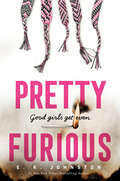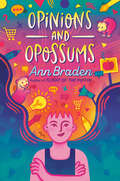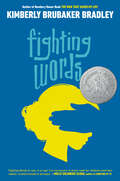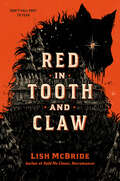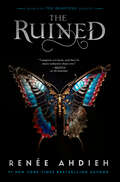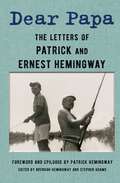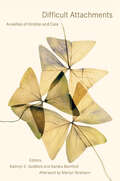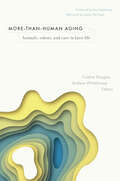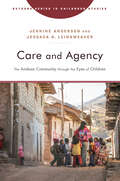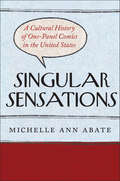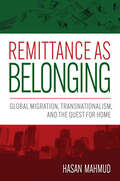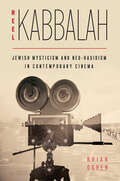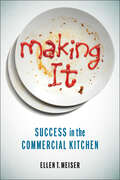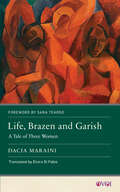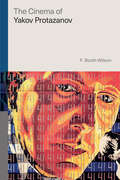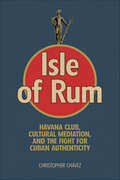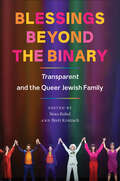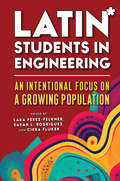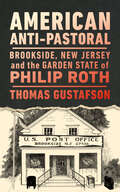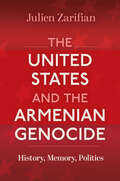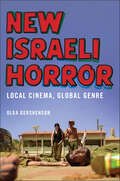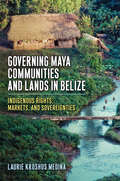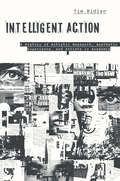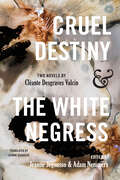- Table View
- List View
Pretty Furious
by E.K. Johnston#1 NYT Bestseller E.K. Johnston returns to contemporary feminist YA. This story of a small town, fierce friendships, and revenge served cold is a perfect companion to Exit, Pursued by a Bear.In the small town of Eganston, Ontario, five good girls have had enough. They&’ve experienced the best of what their community has to offer, but they&’ve seen the darker side too. Together, they&’ve decided that it&’s time for a reckoning and that justice is their privilege to give.
Opinions and Opossums
by Ann BradenA School Library Journal Best BookAgnes has been raised to keep her opinions to herself, but how do you keep silent when you&’re full of burning questions?Agnes has been encouraged not to question authority by her mom—but that&’s especially hard in religion class, where it bugs her that so much gets blamed on Eve and that God&’s always pictured one way. Fortunately, Agnes&’ anthropologist neighbor, Gracy, gets Agnes thinking after they rescue an opossum together. Playing dead didn&’t serve the opossum well, so maybe it&’s time for Agnes to start thinking for herself. And when Agnes learns that some cultures picture God as a female, she feels freed to think—and write—about things from new perspectives. As she and her best friend, Mo, encourage each other to get out of their comfort zone at school as the quiet kids, they quickly find it&’s sorta cool seeing people react when they learn you are very much full of thought-provoking opinions. Ann Braden has written a fast-paced, funny novel that will resonate with anyone who&’s ever been afraid to say what they think or question the status quo.
Fighting Words
by Kimberly Brubaker Bradley*Newbery Honor Book**Boston Globe-Horn Book Honor* A nuanced and fierce middle grade novel about sisterhood and sexual abuse, by two-time Newbery Honor winner and #1 New York Times best seller Kimberly Brubaker Bradley, author of The War that Saved My Life"Fighting Words is raw, it is real, it is necessary, a must-read for children and their adults—a total triumph in all ways." —Holly Goldberg Sloan, New York Times bestselling author of Counting by 7sTen-year-old Della has always had her older sister, Suki: When their mom went to prison, Della had Suki. When their mom's boyfriend took them in, Della had Suki. When that same boyfriend did something so awful they had to run fast, Della had Suki. Suki is Della's own wolf--her protector. But who has been protecting Suki? Della might get told off for swearing at school, but she has always known how to keep quiet where it counts. Then Suki tries to kill herself, and Della's world turns so far upside down, it feels like it's shaking her by the ankles. Maybe she's been quiet about the wrong things. Maybe it's time to be loud.In this powerful novel that explodes the stigma around child sexual abuse and leavens an intense tale with compassion and humor, Kimberly Brubaker Bradley tells a story about two sisters, linked by love and trauma, who must find their own voices before they can find their way back to each other. "Della&’s matter-of-fact narration manages to be as funny and charming as it is devastatingly sad. . . . This is a novel about trauma [but] more than that, it&’s a book about resilience, strength and healing. For every young reader who decides to wait . . . there will be others for whom this is the exact book they need right now." —New York Times Book Review"One of the most important books ever written for kids."—Colby Sharp of Nerdy Book Club"One for the history books."—Betsy Bird for A Fuse #8 Production/SLJ"Gripping. Life-changing...I am awe-struck."—Donna Gephart, author of Lily and Dunkin"Compassionate, truthful, and beautiful."—Elana K. Arnold, author of Damsel"I am blown away. [This] may be Kimberly Brubaker Bradley's best work yet."—Barbara Dee, author of Maybe He Just Likes You"A book that lets [kids] know they have never been alone. And never will be."—Kat Yeh, author of The Truth About Twinkie Pie"Meets the criteria of great children's literature that [will] resonate with adults too."—Bitch Media* "At once heartbreaking and hopeful."—Kirkus (starred review)* "Honest [and] empowering...An important book for readers of all ages."—SLJ (starred review)* "Sensitive[,] deft, and vivid."—BCCB (starred review)* "Prepare to read furiously."—Booklist (starred review) * "An essential, powerful mirror and window for any reader."—PW (starred review)* "Enlightening, empowering and--yes--uplifting."—BookPage (starred review)* "Unforgettable."—The Horn Book (starred review)
Red in Tooth and Claw
by Lish McBrideA dark young adult Western fantasy about a teen in a remote settlement full of monsters and secrets."In this eerie, blood-splashed Western, Lish McBride invokes a frontier that is harsh, cruel, and practical...A damned enjoyable novel." —Kendare Blake, #1 New York Times bestselling author of Three Dark CrownsFaolan Kelly&’s grandfather is dead. She&’s alone in the world and suddenly homeless, all because the local powers that be don&’t think a young man of sixteen is mature enough to take over his grandfather&’s homestead…and that&’s with them thinking Faolan is a young man. If she revealed that her grandfather had been disguising her for years, they would marry her off at the first opportunity.The mayor finds a solution that serves everyone but Faolan: He hires a gunslinger to ship her off to the Settlement, a remote fort where social outcasts live under the leadership of His Benevolence Gideon Dillard. It's a place rife with mystery, kept afloat by suspicious wealth. Dillard's absolute command over his staff just doesn't seem right. And neither do the strange noises that keep Faolan up at night.When Faolan finds the body of a Settlement boarder, mangled by something that can&’t possibly be human, it&’s clear something vicious is stalking the palisades. And as Settlement boarders continue to drop like flies, Faolan knows she must escape to evade the creature&’s wrath.
Curses
by Lish McBride"Curses is the 'Beauty and the Beast' retelling I've been waiting for." --Marissa Meyer, #1 New York Times bestselling author"A unique and twisty magical romp!" --Tamora Pierce, New York Times bestselling authorMerit Cravan refused to fulfill her obligation to marry a prince, leading to a fairy godling's curse. She will be forced to live as a beast forever, unless she agrees to marry a man of her mother's choosing before her eighteenth birthday.Tevin Dumont has always been a pawn in his family's cons. The prettiest boy in a big family, his job is to tempt naïve rich girls to abandon their engagements, unless their parents agree to pay him off. But after his mother runs afoul of the beast, she decides to trade Tevin for her own freedom. Now, Tevin and Merit have agreed that he can pay off his mother's debt by using his con-artist skills to help Merit find the best match . . . but what if the best match is Tevin himself?
The Ruined (The Beautiful Quartet #4)
by Renée AhdiehThe stunning conclusion to the instant New York Times bestselling quartet that began with The Beautiful.The Sylvan Vale and the Sylvan Wyld are at war. Now that the unsteady truce between them has been broken, lines must be drawn. In an effort to protect the weakened Winter Court, Bastien rallies powerful allies and friends in New Orleans to come to their aid. Meanwhile, under protection alongside her injured mother in the Summer Court, Celine is uncertain of whom to trust. She cannot get word to Bastien, and does not understand why he has not returned. When she realizes war between the fey courts is imminent, she journeys with Ali in an effort to find the time traveling mirror and change their fate. But when Celine&’s rivals realize Bastien has rallied his allies in the mortal world, they decide to take the fight to him.
Dear Papa: The Letters of Patrick and Ernest Hemingway
by Ernest Hemingway Patrick HemingwayAn intimate and illuminating glimpse at Ernest Hemingway as a father, revealed through a selection of letters he and his son Patrick exchanged over the span of twenty years.In the public imagination, Ernest Hemingway looms larger than life. But the actual person behind the legend has long remained elusive. Now, his son Patrick shares the letters they exchanged over two decades, offering a glimpse into how one of America&’s most iconic writers interacted with his children. These letters reveal a father who wished for his children to share his interests—hunting, fishing, travel—and a son who was receptive to the experiences his father offered. Edited by and including an introduction by Patrick Hemingway&’s nephew Brendan Hemingway and his grandson Stephen Adams, and featuring a prologue and epilogue by Patrick reflecting on his father&’s legacy, Dear Papa is a loving and collaborative family project and a nuanced, fascinating portrait of a father and son.
Difficult Attachments: Anxieties of Kinship and Care
by Marilyn Strathern Sandra Bamford Michael Lambek Jason Danely Deborah A. Boehm Danilyn Rutherford Katie Kilroy-Marac Julia Kowalski Kathryn E. Goldfarb Janelle S. Taylor Celeste Pang Noa Vaisman Erika Finestone Dawa Lokyitsang Riché J. Barnes Patrick McKenzie Brady G’Sell Sonia Yuhui ZhangAnthropologists have long considered kinship as the basis for social solidarity. Indeed, the idea that kinship is grounded in positive sociality has found its way into most anthropological accounts and has served as an orienting framework directing decades of scholarly research. But what about when it is not? What about instances when kinship is anything but ‘warm and fuzzy’ but is characterized, instead, by neglect, violence, negative affect, or a lack of nurturance and care? In the three interlinked sections of this volume, the view that kinship is about “solidarity” and “care” is challenged by exploring how kin relations are not only about connection and inclusion but also about disconnection, exclusion, neglect, and violence. Kinship relationships that feel “positive” and “good” take a great deal of perseverance and work; there is nothing “natural” about kinship ties as being based on positive sociality. In these chapters, the contributors take seriously the contingency of kinship relations (the moments when kinship breaks down or is a source of suffering) and how this prompts scholars to develop new theoretical and methodological perspectives.
More-than-Human Aging: Animals, Robots, and Care in Later Life (Global Perspectives on Aging)
by Andrew Whitehouse Cristina DouglasWhat does later life look like when it is lived in the companionship of other species? Similarly, how do other species age (or not) with humans, and what sort of (a)symmetries, if any, are brought to light around how we understand and think about aging? So far, aging has been investigated in the social sciences in purely human terms. This is the first collection of original work that considers aging as taking place in relation to other species. This volume aims to start a conversation about aging by taking its more-than-human participants seriously—that is, not only as a support for or context of human aging but also, more symmetrically, as agents and subjects in the process of aging. The contributors draw upon richly descriptive ethnographic accounts, including moments of connection between seniors and dogs in a long-term care facility, human care for aging laboratory animals, and robotic companionship in later life. The ethnographies in this volume not only enrich our understanding of more-than-human companionship during the human aging process but also challenge and urge us to rethink what it means to live later in life in ecologically entangled social and moral worlds.
Care and Agency: The Andean Community through the Eyes of Children (Rutgers Series in Childhood Studies)
by Jessaca B. Leinaweaver Jeanine AndersonAndean communities occupy a special place in the history of anthropology, having given shape to fundamental theories of kinship, peasant economics, Indigenous medical systems, ritual life and others. Yet children have been shortchanged in research and theory building. Care and Agency, based on detailed ethnographies of six towns in the province of Yauyos, restores children to a central research position. Contemporary children’s studies emphasize children’s agency and autonomy, and these take surprising forms under the conditions of the rural Andes. At the same time, the book incorporates and extends current discussions of caregiving and its organization in human societies. Children in the Andes are involved in the care of each other, of adults, of animals, of the environment. The activities, sociality, and subjective states of children of different ages, genders, and social strata are variable in ways that make it impossible to speak of a single Andean childhood. The future they face is also uncertain, as the Peruvian nation stumbles through cycles of incompetent government whose common thread is the neglect of small-scale family farming and the welfare of rural populations. This book is a fascinating look at Andean childhood for anyone interested in the lives of children.
Singular Sensations: A Cultural History of One-Panel Comics in the United States
by Michelle Ann AbateWhat do The Family Circus, Ziggy, and The Far Side have in common? They are all single-panel comics, a seemingly simple form that cartoonists have used in vastly different ways. Singular Sensations is the first book-length critical study to examine this important but long-neglected mode of cartoon art. Michelle Ann Abate provides an overview of how the American single-panel comic evolved, starting with Thomas Nast’s political cartoons and R.F. Outcault’s groundbreaking Yellow Kid series in the nineteenth century. In subsequent chapters, she explores everything from wry New Yorker cartoons to zany twenty-first-century comics like Bizarro. Offering an important corrective to the canonical definition of comics as “sequential art,” Abate reveals the complexity, artistry, and influence of the single-panel art form. Engaging with a wide range of historical time periods, sociopolitical subjects, and aesthetic styles, Singular Sensations demonstrates how comics as we know and love them would not be the same without single-panel titles. Abate’s book brings the single-panel comic out of the margins and into the foreground.
Remittance as Belonging: Global Migration, Transnationalism, and the Quest for Home
by Hasan MahmudRemittance as Belonging: Global Migration, Transnationalism, and the Quest for Home argues that migrants' remittances express their sense of belonging and connectedness to their home country of origin, making an integral part of both migrants’ ethnic identity and sense of what they call home. Drawing on three and a half years of ethnographic fieldwork with Bangladeshi migrants in Tokyo and Los Angeles, Hasan Mahmud demonstrates that while migrants go abroad for various reasons, they do not travel alone. Although they leave behind their families in Bangladesh, they move abroad essentially as members of their family and community and maintain their belonging to home through transnational practices, including remittance sending. By conceptualizing remittance as an expression of migrants’ belonging, this book presents detailed accounts of the emergence, growth, decline, and revival of remittances as a function of transformations in migrants’ sense of belonging to home.
Reel Kabbalah: Jewish Mysticism and Neo-Hasidism in Contemporary Cinema
by Brian OgrenReel Kabbalah: Jewish Mysticism and Neo-Hasidism in Contemporary Cinema studies the ways in which fictional film in the first decade of the twenty-first century represents the esoteric Jewish speculative traditions known as Kabbalah and Hasidism. It examines the textual and conceptual traditions behind five important cinematic representations -- Pi (1998), Ushpizin (2004), Bee Season (2005), The Secrets (2007), and A Serious Man (2009) -- and it considers how film both stands in continuity with those traditions and modifies them in the New Age vein of what is known as neo-Kabbalah and neo-Hasidism. Brian Ogren transforms our understanding of reception history by focusing on how cinema has altered perceptions of Jewish mysticism. In showing how the Jewish speculative traditions of Kabbalah and Hasidism have been able to affect mass-consumed cinematic portrayals of ultimate Truth, this book sheds light on the New Age, pop-cultural dialectic of the particular within the universal and of the universal within the particular.
Making It: Success in the Commercial Kitchen
by Ellen T. MeiserThe restaurant industry is one of the few places in America where workers from lower-class backgrounds can rise to positions of power and prestige. Yet with over four million cooks and food-preparation workers employed in America’s restaurants, not everyone makes it to the high-status position of chef. What factors determine who rises the ranks in this fiercely competitive pressure-cooker environment? Making It explores how the career path of restaurant workers depends on their accumulation of kitchen capital, a cultural asset based not only on their ability to cook but also on how well they can fit into the workplace culture and negotiate its hierarchical structures. After spending 120 hours working in a restaurant kitchen and interviewing fifty chefs and cooks from fine-dining establishments and greasy-spoon diners across the country, sociologist Ellen Meiser discovers many strategies for accumulating kitchen capital. For some, it involves education and the performance of expertise; others climb the ranks by controlling their own emotions or exerting control over coworkers. Making It offers a close and personal look at how knowledge, power, and interpersonal skills come together to determine who succeeds and who fails in the high-pressure world of the restaurant kitchen.
Life, Brazen and Garish: A Tale of Three Women (Other Voices of Italy)
by Dacia MarainiThree generations of women live together under the same roof. Though they are united by blood, each of the Cascadei women has a very different personality and way of expressing herself. Teenage daughter Lori scribbles impulsively in her diary, so eager to speed off on her moped that she rarely bothers with punctuation. Mother Maria, a professional translator, writes detailed and observant letters yet doesn’t see what is happening right in front of her. And grandmother Gesuina, a former stage actress, speaks into an audio recorder, giving a provocative and brutally candid performance for an imagined audience that might never listen. Life, Brazen and Garish offers a fresh take on the epistolary novel, telling the story of a family through the fragmented and disparate perspectives of daughter, mother, and grandmother. Yet even as each woman endures her private struggles with love and betrayal, youth and maturity, knowledge and ignorance, reality and illusion, the Cascadeis forge a solidarity that transcends generations. In turns heartbreaking and laugh-out-loud funny, this novel is a triumph of narrative voice and literary style from one of Italy’s most renowned writers. Questo libro è stato tradotto grazie a un contributo del Ministero degli Affari Esteri e della Cooperazione Internazionale italiano. This book has been translated thanks to a contribution from the Italian Ministry of Foreign Affairs and International Cooperation.
The Cinema of Yakov Protazanov (Global Film Directors)
by F. Booth WilsonBest known for Aelita (1924), the classic science-fiction film of the Soviet silent era, Yakov Protazanov directed over a hundred films in a career spanning three decades. Called "the Russian D.W. Griffith" in the 1910s for his formative role in the first movies in the last years of the Russian Empire, he fled the Civil War and maintained a successful career in Europe before making an unusual decision to return to Russia now under Soviet power. There his films continued their remarkable success with audiences undergoing a bewildering and often brutal revolutionary transformation. Rather than treating him as an indistinct, if capable craftsman, The Cinema of Yakov Protazanov argues that his films are suffused with a unique creative vision that reflects both his mindset as a traditional Russian intellectual and his experience of dislocation and migration after 1917. As he adapted his films to revolutionary culture, they intermingled different voices and reinterpreted his past work from a disavowed era. Offering fresh perspectives of Protazanov’s films, the book will give readers a new appreciation of his career. The book offers a uniquely valuable vantage point from which to explore how cinema reflected a society in transformation and a seminal moment in the development of cinematic art.
Isle of Rum: Havana Club, Cultural Mediation, and the Fight for Cuban Authenticity
by Christopher ChávezFocusing on Havana Club rum as a case study, Isle of Rum examines the ways in which Western cultural producers, working in collaboration with the Cuban state, have assumed responsibility for representing Cuba to the outside world. Christopher Chávez focuses specifically on the role of advertising practitioners, musicians, filmmakers, and visual artists, who stand to benefit economically by selling an image of Cuba to consumers who desperately crave authentic experiences that exist outside of the purview of the marketplace. Rather than laying claim to authentic Cuban culture, Chávez explores which aspects of Cuban culture are deemed most compelling and, therefore, most profitable by corporate marketers. As a joint venture between the Cuban state and Pernod Ricard, a global spirits marketer based in Paris, Havana Club embodies the larger process of economic reform, which was meant to reintegrate Cuba into global markets during Cuba’s Special Period in a Time of Peace.
Blessings Beyond the Binary: Transparent and the Queer Jewish Family
by Kathryn Lofton Josh Lambert Jarrod Tanny Shaul Magid Jodi Eichler-Levine Martin Shuster Sarah Bunin Benor Ranen Omer-Sherman Jennifer Glaser Shari Rabin Marilyn Reizbaum Warren Hoffman Joshua Falek Kerstin SteitzTransparent made history as the first television show to feature a transgender character in the main role, as the first streaming series to win the Golden Globe for Best Television Series, and as, in the words of journalist Debra Nussbaum Cohen, “the Jewiest show ever.” No television show in history has depicted the lives of American Jews with as much attention to Jewish rituals, quirks, or culture. And no series has portrayed issues of gender and sexuality alongside Judaism with such nuance and depth, making Transparent a landmark series in the history of television. Blessings beyond the Binary brings together leading scholars to analyze and offer commentary on what scholar Josh Lambert calls “the most important work of Jewish culture of the century so far.” The book explores the show’s depiction of Jewish life, religion, and history, as well as Transparent’s scandals and criticisms and how it fits into and diverges from today’s transgender and queer politics. The first book to focus on Transparent, Blessings beyond the Binary offers a rich analysis of the groundbreaking series and its connections to contemporary queer, trans, and Jewish life.
Latin* Students in Engineering: An Intentional Focus on a Growing Population
by Taryn Ozuna Allen Christine Hall Diana Garza Michael Perez Tonisha B. Lane Maria L Espino Morgan Nichols Brian D Le Blanca Rincón René Hernandez Erin Doran Elizabeth Turochy Cristina Poleacovschi Timothy Yuen Dina Verdín Renata Revelo Janice Mejía Da'Shay Portis Templeton Hector E Rodriguez-Simmonds Leonardo Pollettini Marcos Cristián Vargas-Ordóñez Kevin Jay Kaufman-Ortiz Selyna Pérez Beverly Lisa R Lattuca Courtney Matthews Lisette E Torres Krystal Peralez Elsa Gonzalez Emma Claudia Perez Adriana Facundo Ulises Trujillo Garcia Esther EnrightThe growing population of engineering students who identify as Latin* are underrepresented in the field of engineering. Latin* refers to an individual of Latin American origin or descent, without restricting to a specific gender. The asterisk (*) includes related identity terms such as Latina/é/o/u/x.There is, however, a rising need to train U.S. students in engineering skills to meet the demands of our increasingly technological workforce. Structurally excluding Latin* students hinders their economic and educational opportunities in engineering. Latin* Students in Engineering examines the state of Latin* engineering education at present as well as considerations for policy and practice regarding engineering education aimed at enhancing opportunity and better serving Latin* students. The essays in this volume first consider, theoretically and empirically, the experiences of Latin* students in engineering education and then expand beyond the student level to focus on institutional and social structures that challenge Latin* students' success and retention. Finally, it illuminates emergent work and considers future research, policy, and practice.
American Anti-Pastoral: Brookside, New Jersey and the Garden State of Philip Roth (CERES: Rutgers Studies in History)
by Thomas GustafsonOne of the best-known novels taking place in New Jersey, Philip Roth’s 1997 American Pastoral uses the fictional hamlet of Old Rimrock, NJ as a microcosm for a nation in crisis during the cultural upheavals of the 1960s-70s. Critics have called Old Rimrock mythic, but it is based on a very real place: the small Morris county town of Brookside, New Jersey. American Anti-Pastoral reads the events in Roth’s novel in relation to the history of Brookside and its region. While Roth’s protagonist Seymour “Swede” Levov initially views Old Rimrock as an idyllic paradise within the Garden State, its real-world counterpart has a more complex past in its origins as a small industrial village, as well as a site for the politics of exclusionary zoning and a 1960s anti-war protest at its celebrated 4th of July parade. Literary historian and Brookside native Thomas Gustafson casts Roth’s canonical novel in a fresh light as he studies both Old Rimrock in comparison to Brookside and the novel in relationship to NJ literature, making a case for it as the Great New Jersey novel. For Roth fans and history buffs alike, American Anti-Pastoral peels back the myths about the bucolic Garden State countryside to reveal deep fissures along the fault-lines of race and religion in American democracy.
The United States and the Armenian Genocide: History, Memory, Politics (Genocide, Political Violence, Human Rights)
by Julien ZarifianDuring the first World War, over a million Armenians were killed as Ottoman Turks embarked on a bloody campaign of ethnic cleansing. Scholars have long described these massacres as genocide, one of Hitler’s prime inspirations for the Holocaust, yet the United States did not officially recognize the Armenian Genocide until 2021. This is the first book to examine how and why the United States refused to acknowledge the Armenian Genocide until the early 2020s. Although the American government expressed sympathy towards the plight of the Armenians in the 1910s and 1920s, historian Julien Zarifian explores how, from the 1960s, a set of geopolitical and institutional factors soon led the United States to adopt a policy of genocide non-recognition which it would cling to for over fifty years, through Republican and Democratic administrations alike. He describes the forces on each side of this issue: activists from the US Armenian diaspora and their allies, challenging Cold War statesmen worried about alienating NATO ally Turkey and dealing with a widespread American reluctance to directly confront the horrors of the past. Drawing from congressional records, rare newspapers, and interviews with lobbyists and decision-makers, he reveals how genocide recognition became such a complex, politically sensitive issue.
New Israeli Horror: Local Cinema, Global Genre
by Olga GershensonBefore 2010, there were no Israeli horror films. Then distinctly Israeli serial killers, zombies, vampires, and ghosts invaded local screens. The next decade saw a blossoming of the genre by young Israeli filmmakers. New Israeli Horror is the first book to tell their story. Through in-depth analysis, engaging storytelling, and interviews with the filmmakers, Olga Gershenson explores their films from inception to reception. She shows how these films challenge traditional representations of Israel and its people, while also appealing to audiences around the world. Gershenson introduces an innovative conceptual framework of adaptation, which explains how filmmakers adapt global genre tropes to local reality. It illuminates the ways in which Israeli horror borrows and diverges from its international models. New Israeli Horror offers an exciting and original contribution to our understanding of both Israeli cinema and the horror genre. A companion website to this book is available at https://blogs.umass.edu/newisraelihorror/ (https://blogs.umass.edu/newisraelihorror/) Book trailer: https://youtu.be/oVJsD0QCORw (https://youtu.be/oVJsD0QCORw)
Governing Maya Communities and Lands in Belize: Indigenous Rights, Markets, and Sovereignties
by Laurie Kroshus MedinaConfronting a debt crisis, the Belizean government has strategized to maximize revenues from lands designated as state property, privatizing lands for cash crop production and granting concessions for timber and oil extraction. Meanwhile, conservation NGOs have lobbied to establish protected areas on these lands to address a global biodiversity crisis. They promoted ecotourism as a market-based mechanism to fund both conservation and debt repayment; ecotourism also became a mechanism for governing lands and people—even state actors themselves—through the market. Mopan and Q’eqchi’ Maya communities, dispossessed of lands and livelihoods through these efforts, pursued claims for Indigenous rights to their traditional lands through Inter-American and Belizean judicial systems. This book examines the interplay of conflicting forms of governance that emerged as these strategies intersected: state performances of sovereignty over lands and people, neoliberal rule through the market, and Indigenous rights-claiming, which challenged both market logics and practices of sovereignty.
Intelligent Action: A History of Artistic Research, Aesthetic Experience, and Artists in Academia
by Timothy RidlenThrough archival research and analysis of artworks by Gyorgy Kepes, Allan Kaprow, Mel Bochner, and Suzanne Lacy, among others, Intelligent Action examines how these artists brought alternatives to dominant conceptions of research and knowledge production. The book is organized around specific institutional formations—artistic research centers, proposals, exhibitions on college campuses, and the establishment of new schools or pedagogic programs. Formal and social analysis demonstrate how artists responded to ideas of research, knowledge production, information, and pedagogy. Works discussed were produced between 1958 and 1975, a moment when boundaries between media were breaking down in response to technological, cultural, and generational change. In the context of academia, these artistic practices have taken up the look, feel, or language of various research and teaching practices. In some cases, artists bent to the demands of the cold war research university, while in others, artists developed new modes of practice and pedagogy. Reading these works through their institutional histories, author Tim Ridlem shows how artistic research practices and artistic subjectivity developed in the long 1960s within and alongside academia, transforming the role of artists in the process.
Cruel Destiny and The White Negress: Two Novels by Cléante Desgraves Valcin
by Cléante D. ValcinCléante Desgraves Valcin (1891-1956) was a poet, writer, and feminist—most prominently Haiti’s first published female novelist, who employed her sentimental fiction to explore matters of race, gender, nationalism, and sovereignty. A contemporary of Harlem Renaissance writers such as Nella Larsen and Zora Neale Hurston, Valcin emerged as an influential writer and political figure among the Black Atlantic diaspora. Now, for the first time, her two acclaimed novels are available in English translation. Cruel Destiny (1929) tells the tragic love story of Armand and Adeline, drawn together by a magnetic attraction, yet kept apart by a dark family secret. Depicting the heavy expectations placed upon women in Haiti’s elite society, it also explores the troubled and twisted relationships between the Haitians and their former colonial masters, the French. In The White Negress (1934), a Frenchwoman moves to Haiti and is torn between two very different men, a Black Haitian lawyer, and a white American carpetbagger. Putting a fresh spin on the tired tragic mulatta trope, Valcin reveals the racial prejudices, class tensions, and anti-colonial resentments of an island under American occupation. Together, these two novels expand our understanding of Caribbean literature, as well as the political struggles and artistic triumphs of Black women in the Americas.
